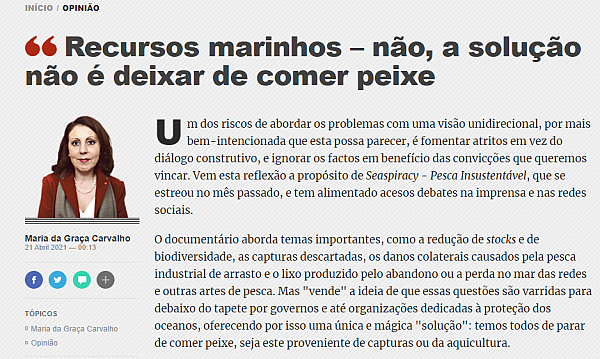Press Marine resources - no, the solution is not to stop eating fish
One of the risks of approaching problems with a unidirectional view, as well-intentioned as it may seem, is to encourage friction instead of constructive dialogue, and to ignore the facts in favor of the convictions that we want to emphasize. This reflection comes on the subject of “Seaspiracy - Unsustainable Fishing”, which debuted last month, and has fueled heated debates in the press and social networks.
The documentary addresses important issues, such as the reduction of stocks and biodiversity, discarded catches, collateral damage caused by industrial trawling and the waste produced by the abandonment or loss at sea of nets and other fishing gear. However, it “sells” the idea that these problems are swept under the rug by governments and even organizations dedicated to protecting the oceans, thus offering a unique and magical “solution”: we all have to stop eating fish, whether it comes from catches or aquaculture.
The first problem with this type of verdict is its impracticality. The fisheries and aquaculture sectors, according to the latest official data from the European Union, are responsible for more than 150 thousand full-time jobs in Europe, to which must be added many jobs in the manufacturing industry and other related activities. Without forgetting the fundamental role of fish and other sea products in the food of the population, particularly in the countries of the South, as is the case in Portugal.
The second problem, perhaps more serious, and resulting from the lack of scientific rigor with which these documentaries-pamphlets are often produced, is precisely to instill in public opinion the idea that it should distrust legislators and all national and international public authorities. And that, therefore, the only valid and impactful actions are those undertaken individually.
Far be it from me to devalue the transformative role that individual behavior can play, particularly with regard to environmental sustainability issues. But anyone who wants to convey the idea that this will be enough, that political measures will not be necessary, involving all interested parties, creating compromises, using scientific knowledge, investing on innovation, will never be more than a seller of illusions. Citizens must expect - indeed: demand - that their representatives create solutions.
Just over a decade ago, the European Union was facing a problem of overexploiting of most of its fishing resources. Since then, a very significant effort has been made to regulate this activity, which included, for example, the prohibition of trawling over 800 meters deep, and the greater limitation of quotas on catches of different species. In 2019, according to data from the Commission, almost all catches managed exclusively by the European Union were from stocks with sustainable levels.
In addition, there are many other initiatives taking place, including projects aimed at exploring the nutritional potential of underutilized marine resources, such as plankton and algae, and discussions about the waste arising from fishing activities and the mandatory discharge of all catches.
Recently, in the European Parliament, I was elected vice-chairman of the Committee on Fisheries (PECH). My commitment is that I will do everything, based on scientific evidence, the opinion of experts and the expressed will of European citizens, to help protect our marine resources and their future sustainability, but also the people who depend on them.
